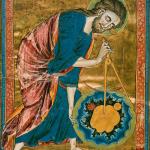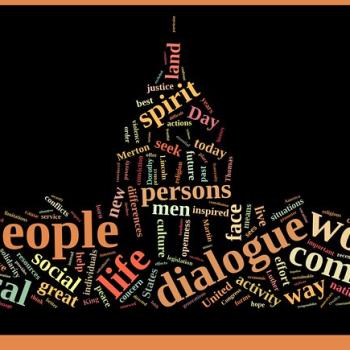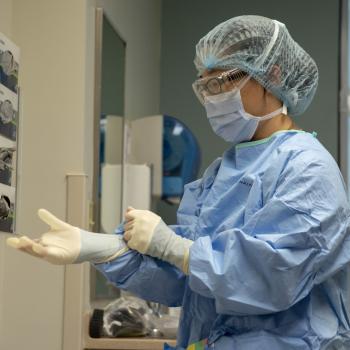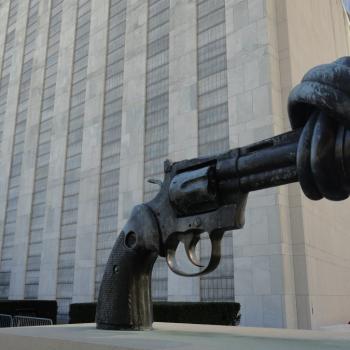
There are many doctors who have been recognized as saints; tradition suggests the author of the Gospel of Luke is one of them. The practice of medicine is an important, indeed, it is a great way for Christians to embrace their faith. This is because those who practice medicine can be seen to imitate and follow after Christ, for Christ came to heal people in soul and in body. This is why St. Basil, writing to a doctor, could say:
Truly, humanity is the concern of all of you who follow the profession of medicine. And it seems to me that he who would prefer your profession to all other life pursuits would make a proper choice, not straying from the right, if really the most precious of all things, life, is painful and undesirable unless it can be possessed with health. And your profession is the supply vein of health. [1]
Some saintly doctors, it has been suggested, were rather miraculous with their healing abilities, as can be seen in the stories surrounding saints Cyrus and John, unmercenaries. Nonetheless, not all doctors have lived such holy lives that they could be recognized as saints; they do not have to be holy to be good doctors. The art of medicine does not require holiness, though holiness can lead people to practice it. Doctors do good, whether or not they are personally holy, because they work to save lives (or help people maintain as high a quality of life as possible).
The good done by doctors should be readily acknowledged, not derided. Christians should not deny themselves access to doctors and medicine under the mantle of the faith. While some Christian might say that we should merely put our faith and trust in God, and God will heal us if God desires it, all they are doing is putting God to the test. They are forcing God to act instead of doing what God expects them to do, to live and act with wisdom. God allows us to act, and what happens to us will come as a result of our actions. We can and will prematurely die if we are foolish; even in Scripture, God shows that the choices people make will help determine how long they shall live (as well as the quality of life we shall have for as long as we live).
What the doctors offer us is good because our health, our lives, are goods to be affirmed. Not only should we take advantage of the resources which have been given to us, we must encourage others to do so. If, on the other hand, we discourage people and tell them not to take care of their health, if we tell them to avoid doctors or taking their medicine, and they die as a result of our advice, it is quite possible that God will hold us culpable for their unnecessary deaths:
“Thou shalt do no murder.” Amongst others, doctors murder by their ignorance of the sick man’s illness when they prescribe him injurious medicine. Those also commit murder who will not have a doctor to attend them or another person who is ill and requires the doctor’s help. Those commit murder who irritate a sick man to whom any irritation may be fatal — for instance, a consumptive person – and thus hasten to his death. Those commit murder who, through avarice or any other bad reason, delay in affording the doctor’s help to a sick person, or in giving bread to the hungry. [2]
People often do not like being told what to do. But the fact of the matter is, since our knowledge has limits, there are situations where we find ourselves having to be told what to do by those who know more than we do. This is especially true when our action or inaction is liable to harm others. The state has the power and authority to promote the common good, to create legislation which tells us what to do. The key, of course, is that it should offer as much freedom as possible, to not overburden us with legislation, but yet to make sure we are prevented from causing great, unnecessary harm to others. This is why if some law or mandate is put into effect, when it promotes the common good and saves countless lives, it would be ridiculous say people are being overburdened by the state. We should not be allowed to drink and drive. We should not be allowed to work in a restaurant with unwashed hands. Society has a right to be protected from undue harm, and those in positions of authority have a duty to enforce that right. This sometimes means society, with its rights, might have to dictate medical care, such as taking a vaccine, when there is a health emergency in place.
Because people don’t like being told what to do, they create excuses to justify ignoring their responsibility to society. One of the worst excuses some Christians use to deny their proper service to society is to suggest that such service is contrary to their faith when it is not. To lie in such a fashion is a great sin. Thus, those Christians who claim it is against their faith to be vaccinated cause great scandal by their lie. From the very beginning of the Christian faith, Christians have accepted and embraced the work of doctors. Vaccination is one of the many gifts given to us through medical science, and it has been shown to be effective; when lack of vaccination leads to large numbers of unnecessary deaths, those who impede vaccination efforts are culpable for the deaths which ensue, and if they do so by lying, they show how little they care for either life or truth itself.
It is a sick society which is unwilling to do what it takes to protect the common good, and so it is a sick society which is unwilling to embrace medical care which would protect everyone from grave danger. We should not be surprised, therefore, many people, sick as they are, will not take sound advice when it comes to the welfare of society, as people often do not like to take such advice when it comes to their own personal health in other situations:
Sick persons like what is not good for them, and when ill health takes control of the human frame the sufferer makes perverse demands, counter to their own welfare. The mind, preyed upon by the languor of affliction, incessantly craves what will merely aggravate the disease. Spurns with contempt the healing arts, and hastens with impatient desire to its own downfall. Then if the mischief of the disease grows worse, stouter remedies are invoked; the medical art, solicitous for the patent’s welfare, resorts to sterner measures. Disagreeable foods and bitter potions are forced upon the unwilling sufferer, and if the trouble worsens both cautery and knife are tried. So when the patient recovers his health and he has his well-being restored, he acknowledges with a revival of sound judgment that whatever was done to him against his will for the infirmity of his sick body, was all done for his own good.[3]
This seems to be proven to be universally true during the current COVID19 pandemic, where we find large numbers of society doing the things which not only will make the pandemic continue, but to make it potentially much worse. Those who refuse to wear masks, those who refuse to be vaccinated, those who refuse any and all basic precautions, even when they know they are sick, demonstrate how far off they are from the healthy attitude they should have. Some are so selfish that even when they know they are sick and they are near vulnerable people, they do not care and are unwilling to do anything to protect their neighbor from themselves. They think they should be free to invade the space of others, and in doing so, they cause many of them to get sick (and sometimes, die). They want no one to stop them from doing anything which they desire. But we must not let such selfishness dictate policy; we must acknowledge the needs of the common good and do what is necessary to protect society. We must follow medical advice, even if we do not like what we have to do, so that in the end, we can overcome the pandemic and find ourselves in a new, better situation.
Only if Christians are willing to do what it takes to overcome the pandemic do they show they are pro-life, pro-human dignity; if they put their private desires over the interests and lives of others, they show how far they are from justice, how far they are from the God who is just. The worst things Christians can do is claim religious exemption to justify their selfishness, for not only do they go against their religious faith, many will believe them and think it proves Christianity is an evil faith, one which promotes needless death and destruction. Christianity is about the triumph of life over death, of wisdom over foolishness, and of truth and justice over falsehood and sin. We must, therefore, promote the common good, and with it, we must deny any and all selfishness which would reject our obligations to it.
[1] St. Basil, “Letter 189” in Saint Basil: Letter. Volume 2 (186-368). Trans. Agnes Clare Way, CDP (New York: Fathers of the Church, 1955), 25.
[2] St John of Kronstadt, My Life in Christ. Trans. E.E. Goulaeff (London: Cassel and Company, Ltd., 1897; repr. Jordanville, NY: Holy Trinity Monastery, 2000), 140.
[3] Firmicus Maternus, The Error of the Pagan Religions. Trans. Clarence A. Forbes (New York: Newman Press, 1970), 78.












